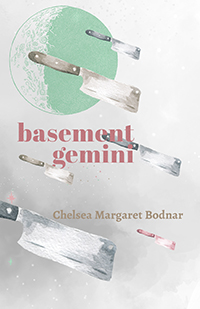I’ve been a fan of horror as a genre since I was a kid, but only recently became aware of how poetry and horror intersect to provide beautifully dark verses capable of illuminating the shadowy side of the human experience. Over the last couple of years, I’ve noticed an increasing number of horror poetry collections written by women in the world (in part, because I’ve been more actively looking for them). It’s exciting to see this develop. Below are a few of the horror poetry books I’ve read and love, and I hope to discover many more in the future.

I am Not Your Final Girl by Claire C. Holland
I Am Not Your Final Girl offers up the female personas of characters of horror cinema — the survivors, victims, villains, and monsters — who prowl through dark worlds, facing oppression, persecution, violence, and death. The women in this collection channel their pain and rage into a galvanizing force. They fight. They claim power over their own bodies. They take their power back. They do not relent. (Full review.)

Southern Cryptozoology: A Field Guide to Beasts of the Southern Wild by Allie Marini
I’ve put Southern Cryptozoology on other favorites lists before and will continue to put it on lists, because this chapbook is one of my favorite poetry reads. This collection presents a bestiary of strange, legendary creatures from the Southern parts of the U.S., examining what it means to be monster or human, beast or woman, myth or flesh.

R E D by Chase Berggrun
In R E D, Berggrun presents a series of erasures of Bram Stoker’s Dracula. The poems transform the text from a storyline in which women have little to no agency to a stunning exploration of abuse, violence, power dynamics, and femininity.

Basement Gemini by Chelsea Margaret Bodnar
Basement Gemini is a gorgeous chapbook of poetry that draws on horror movie tropes to explore female power and agency. There’s a kaleidoscopic beauty to these untitled lyrical prose poems that feel cohesive a cohesive whole. Chelsea says, “Basement Gemini was kind of born out of that idea — the simultaneous, seemingly-contradictory-but-not-really victimization, vilification, and empowerment of women that’s encountered so often in horror.”

Heliophobia by Saba Syed Razvi
Razvi’s collection tangles together darkness and light into a dark tapestry of power poems. As Razvi describes her book, “I suppose these poems are some kind of unholy fusion of museums, goth clubs, meditations, and global diaspora — all rewritten through dream logic, in some kind of ink made of the timeless decay of memory!”
Horror poetry books by women on my TBR:
- A Collection of Nightmares by Christina Sng
- Love Lessons from Buffy the Vampire Slayer by Lisa Cheby
- Love for Slaughter by Sara Tantlinger
- The Devil’s Dreamland: Poetry Inspired by H.H. Holmes by Sara Tantlinger
- Final Girl by Daphne Gottlieb
- Satan Says by Sharon Olds
- Twisted in Dream: The Collected Weird Poetry of Ann K. Schwader
- How to Recognize a Demon Has Become Your Friend by Linda Addison
- Something in the Potato Room by Heather Cousins
- Satan’s Sweethearts by Marge Simon and Mary A. Turzillo
Newsletter | Twitter | Instagram


